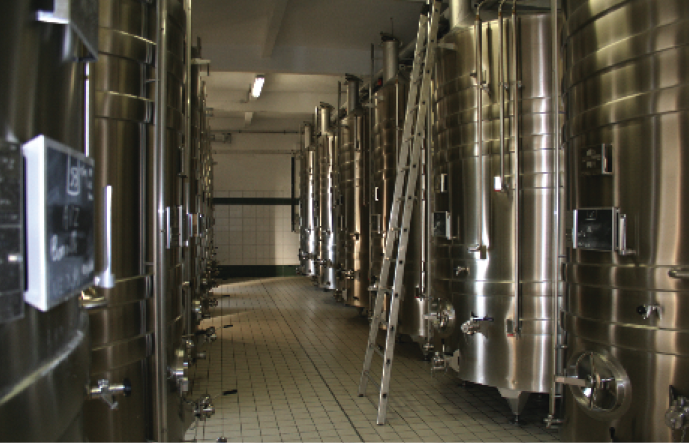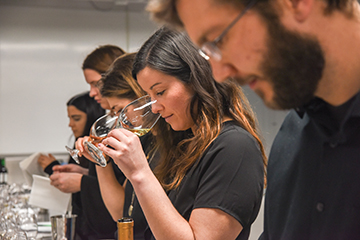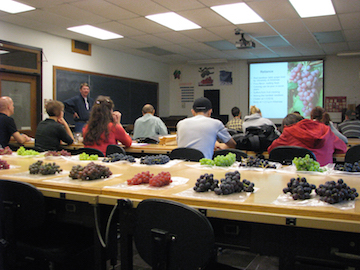
For some hobby winemakers, making a living as a winemaker may just be a dream. For others, it’s the final destination. Do you think you have what it takes? We convinced a few professional winemakers with operations big and small to share some of their own, hard-earned advice about making the big jump into commercial winemaking. We narrowed all their tips into a top ten list that every amateur winemaker should consider before their first commercial crush.
Do the homework.
Planning, research and education are the often overlooked, but most important prerequisites to becoming a commercial winemaker. Take the time to not only read up on your varietals, viticulture and geography, but also map out how your business and marketing plan will work.
“There is a lot of information in the public domain, and much of it is contradictory. Just because someone says what you plan is impossible, doesn’t mean that it is. Likewise just because one person says they’ve done it a certain way doesn’t mean that is the best or only way to do it. A lot of planning is required to ensure success at every step of the winemaking process. The more time spent planning a successful winery up front will save a lot of time and dollars when it comes time to execute.”
Mark Holford, Rocky Creek Winery
“Terry (my husband) and I did several years of research before committing to the idea of opening our own winery. We visited every winery we could that was the same size as we anticipated being and asked them for their success points and their problems. We visited with folks who had gone out of business and asked why. It all came down to this caveat: start small and make the best wine possible. Grow slowly and allow your public to tell you what they want and what they will pay money for, but don’t try to be all things to all people.”
Caris Turpen, Lightcatcher Winery
Be a well-rounded businessperson.
Sure, you make wine, but can you sell it? A passion for making wine is a good start, but a commercial endeavor requires business, accounting and marketing skills. Don’t think that’s your strong suit? Plan on finding partners or employees that fill the void.
“The winemaking part is only a fraction of the work. Make sure you have all of the skills available to you that will be needed — accounting, marketing, planning and administration. Wineries involve a lot of paperwork. If that’s not your cup of tea, better have someone working with or for you with those skills.”
Mark Holford, Rocky Creek Winery
“Have a marketing plan. Half the job is making good wine. The other half is knowing how to sell it!”
Peter Rosback, Sineann Winery
“If marketing is your forte, hire a winemaker or at least a consultant — or vice versa. Do not underestimate a marketing plan. It is the most important part of your well-defined business plan. This includes a very distinct label. I’m not talking about some animal label or your vineyard picture or any mundane thing. It must be uplifting, original and make one want to just walk away with it.”
Vic McWilliams, Castle Vineyards
Make smart financial choices.
Most hobby winemakers need a budget to stick to when making a commercial transition, but even if you have unlimited funds, keep an eye on the bottom line. Little costs add up, and can sink a small business if unchecked.
“Anyone interested in going professional should very carefully assess the economics of doing so. Doing it as a lifestyle is OK, you can scrape out a living (and I mean scrape), but trying to make it a profession to make a lot of money is another thing and requires a lot of money up front to be competitive against the big wine production houses from all over the world.”
Tony Ciccone, Ciccone Vineyard and Winery
“Look for some good, used equipment. Great deals can be had from picking up used equipment from small wineries that are expanding and buying bigger equipment. We were able to get better equipment at half the price.”
Mark Holford, Rocky Creek Winery
“You have to do your research on finding your own niche, then back it up with sound winemaking and a positive, motivated sales environment. If you can’t do that, stay a hobbyist and your failures will only cost you $100 a batch rather than $100,000.”
Caris Turpen, Lightcatcher Winery
“You can’t be everything for everybody. Know your skills and your limitations and do what you do best . . . very well. You get only one chance in today’s environment. Grow within your business plan. Do not get tempted because there is more fruit available or whatever. Stay on course and make sure you oversell, not undersell. There is nothing worse than excess inventory — then you are the discounter.”
Vic McWilliams, Castle Vineyards
Keep space in mind.
Making wine at home requires much less space than commercial winemaking. Choose a location ahead of time that can house your winemaking equipment, as well as your bottles and barrels.
“Be prepared for it to take more space than you thought. Don’t overlook things like warehouse space. Yes those tanks and barrels take a lot of room, but the wine takes even more room once it’s been bottled.”
Mark Holford, Rocky Creek Winery
“You do not need brick and mortar. Start with custom crush facilities. Put your money and resources into the grapes, barrels and marketing.”
Vic McWilliams, Castle Vineyards.
Make friends in the industry.
How will you know if you’re doing something right or wrong? Should you plant this vine or that one? Most of your questions can be answered by fellow winemakers — don’t count them out as just the competition!
“Spend time talking to local wineries and winemakers. Most of those that I’ve met are pretty friendly and happy to share their experiences.”
Mark Holford, Rocky Creek Winery
“One of the dangers of being a commercial winemaker is being isolated from other winemakers. Foster those friendships and maker sure there is a give and take.”
Caris Turpen, Lightcatcher Winery
Choose your location wisely.
Home is where you hang your hats — all of them. If you plan to grow grapes, make sure you buy the right land. If you’re opening a winery, find a region with a good reputation.
“The best land values for vineyards are often in an emerging region that has yet to gain a reputation, but has shown an ability to produce great wines in most vintages. If you’re going to make a go of a professional vineyard or winery, I cannot stress enough that you should go to a region that has shown itself as an exceptional climate for growing winegrapes in a style that you like to drink. While trying to bring quality wine production to a locale in the U.S. desert southwest or the East Coast sounds noble, you may want to consider California, Oregon or Washington if you want to make wines that score and sell well.”
Wes Hagen, Clos Pepe Vineyards
Plan for how your wine will reach the marketplace.
Keep distribution in mind. As a seller, you should always think about how your wine will get into the hands of the buyers.
“Remember first and foremost that the reason you’re going commercial is to sell wine, therefore you have to have a plan in place about how to do that. Do you want to sell to the public through a tasting room where you can figure 80–90% of your sales to take place through retail, or will you have to work through a distributor because your location is too far away or simply cannot do a tasting room, where you will have to make twice as much wine to make the same amount of money?”
Caris Turpen, Lightcatcher Winery
“Direct sales is where you should be at — tasting rooms, wine clubs and Web sites. Only align yourself with a very good and reputable broker or distributor if you absolutely need to. This is not easily done these days, and there are a lot of unfulfilled promises out there when you do find one.”
Vic McWilliams, Castle Vineyards
Grow or source the right fruit and practice cleanliness.
The best fruit yields the best wines —or so they say. Don’t challenge conventional wisdom. Make your wines from the best fruit you can get. And once it’s in your winery, make cleanliness your highest priority.
“Never make a decision on a varietal to plant based primarily on what you like to drink, except if you have purchased property specifically in a locale that suits that varietal. Wine varietals (like Pinot Blanc or Merlot) should always be chosen to fit the site, not the other way around.”
Wes Hagen, Clos Pepe Vineyards
“Without continued long term sourcing of the absolute best fruit, you diminish your chances of success.”
Vic McWilliams, Castle Vineyards
“As my high school chemistry teacher said, ‘be neat, clean and tidy.’”
John Lasgoity, Chateau Lasgoity Winery
Always evaluate.
Your best friend says your wine tastes great. Would a wine critic agree? Your wine needs to be good enough to garner some word of mouth (no pun intended) in order to make money. Devise objective ways to judge your wines.
“Find a dozen acquaintances and make them your tasting panel. Have a panel tasting of every wine you’re considering releasing and do a silent tasting/judging first, then discuss. Do not use your close friends, however, as they will work to unconsciously be nicer to you than people who don’t love you. You want honest, direct opinions.”
Caris Turpen, Lightcatcher Winery
Make wine you love (and that other people will buy).
Your best work will show in the wines you care most about. Determine which varietal or style matches your location with your skills and use it as the center of your business.
“My mentor, Fred Arterberry, told me something I associate with great wisdom 22 years ago that I never forgot. ‘Never make a bottle of wine you are not willing to sell.’ It has many layers of meaning and has served me well.”
Mark Vlossak, St. Innocent Winery
“Determine your niche. How much wine will you make and at what price point? What is special about your wine, is it regional, is it a style, is it different varietals that will draw interest? Understand that 80% of the wine drinking public is relatively new to it, and prefer sweeter wines. Even if you’re committed to “big reds,” be prepared to make other things to sell so you can afford to make those big, dry, bad boys.”
Caris Turpen, Lightcatcher Winery
“Start with a limited line in your portfolio. Choose the varietal that gives you passion, do it well and know its forecasting as best as can be done in the current marketplace.”
Vic McWilliams, Castle Vineyards
“Don’t expect to make Burgundy outside of Burgundy, Bordeaux outside of Bordeaux or Chablis outside of Chablis. Make wines that are true to their pedigree and true to your craftsmanship.”
Wes Hagen, Clos Pepe Vineyards
Being a professional winemaker of course involves making and aging wine, but it will also include negotiating with grape growers and wine distributors, balancing the books, filling out tax forms and perhaps interacting with the public. Turning your hobby into a business may not suit everyone, but for those who will not be stopped, keep these tips in mind — and good luck!
 For some hobby winemakers, making a living as a winemaker may just be a dream. For others, it’s the final destination. Do you think you have what it takes? We convinced a few professional winemakers with operations big and small to share some of their own, hard-earned advice about making the big jump into commercial winemaking. We narrowed all their tips into a top ten list that every amateur winemaker should consider before their first commercial crush.
For some hobby winemakers, making a living as a winemaker may just be a dream. For others, it’s the final destination. Do you think you have what it takes? We convinced a few professional winemakers with operations big and small to share some of their own, hard-earned advice about making the big jump into commercial winemaking. We narrowed all their tips into a top ten list that every amateur winemaker should consider before their first commercial crush.


